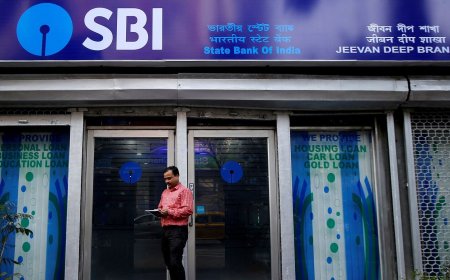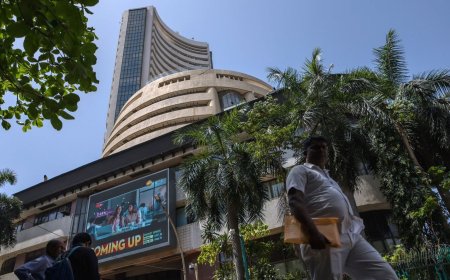Vedanta, Hindalco to Jindal Steel: Metal Stocks Melt up to 4% as Trump Tariff Concerns Resurface
Metal stocks like Vedanta, Hindalco, and Jindal Steel fell up to 4% amid renewed concerns over U.S. tariff policy under Trump. Market experts weigh in.

Indian metal stocks faced a sharp sell-off on Thursday, with leading names such as Vedanta Ltd., Hindalco Industries, and Jindal Steel & Power dropping as much as 4% intraday. The sudden dip comes amid renewed investor anxiety surrounding a potential return of U.S. tariffs on steel and aluminum, should former President Donald Trump return to office in the 2024 U.S. elections.
Market participants are pricing in the likelihood of a revival of protectionist trade policies, with early comments from Trump’s campaign reiterating a tough stance on imports to safeguard American industry. The rhetoric has sparked global concerns, especially for metal exporters like India and China.
Market Performance Snapshot
As of mid-day trade on the NSE:
-
Vedanta Ltd. was down 3.9%, trading at ₹278.75
-
Hindalco Industries fell 3.4% to ₹466.20
-
Jindal Steel & Power declined 3.7% to ₹805.10
-
Tata Steel and JSW Steel also saw cuts of around 2–2.5%
The Nifty Metal index slipped nearly 2.8%, underperforming the benchmark Nifty 50, which remained relatively flat.
Global Trade Anxiety Returns
The metal sector’s underperformance is closely tied to macroeconomic signals and geopolitical developments. A key factor behind Thursday’s slump is the resurfacing of Trump-era trade fears, which were infamous for tariffs imposed under Section 232 on steel and aluminum in 2018.
“Markets are extremely sensitive to U.S. election outcomes this time, especially in sectors like metals which are directly impacted by global demand and trade flows,” said Ravi Menon, Senior Equity Strategist at Kotak Securities. “The early indicators of a possible Trump re-election have triggered caution, as his previous administration was aggressive on import tariffs that affected emerging market exporters.”
Sector-Specific Pressure
Analysts also pointed out that the metal stocks were already on a fragile footing, given muted demand from China and volatile global commodity prices. The re-emergence of U.S. tariff concerns acted as a catalyst for profit booking.
According to ICICI Direct, “Indian metal companies derive a significant portion of their revenue from exports. A return of U.S. steel tariffs could reduce their market access, creating excess supply in Asia and pressuring prices domestically.”
The broader metals sector also faces the double whammy of weak demand and rising input costs, particularly coking coal and energy prices, which are critical for steel production.
What’s at Stake?
The stakes are high for Indian metal exporters, many of whom saw significant gains over the last two years owing to strong global prices and domestic infrastructure growth. However, investors are now re-evaluating long-term exposure.
“If the U.S. imposes tariffs again, even selectively, it could have a domino effect. Other countries might retaliate or adjust their trade policies. This is not just about the U.S. market but about the entire global sentiment turning protectionist,” noted Swati Bajaj, Director of Global Markets at JM Financial.
Investor Outlook: Time to Rebalance or Buy the Dip?
Despite the dip, not all analysts are bearish on the long-term potential of Indian metal companies. Some see this as an overreaction driven by political speculation.
“Until there’s clarity on actual policy decisions post the U.S. elections, such sharp corrections could be opportunities for long-term investors,” said Ajay Kothari, a fund manager with DSP Mutual Fund. “Valuations have come down, and many of these companies have deleveraged significantly in the last two years.”
Still, the short-term outlook remains cautious. Brokerage firm Motilal Oswal has advised a “neutral” stance on the metal sector for the next two quarters, citing uncertain global trade dynamics and a potential slowdown in Chinese industrial activity.
Conclusion
The renewed Trump tariff narrative has reintroduced volatility in India’s metal sector, underscoring how globally integrated commodity sectors remain vulnerable to policy signals from Washington. While there is no certainty yet on whether the former U.S. President will return to office or repeat past policies, the market's knee-jerk reaction reflects deeper anxieties about global trade fragmentation.
For investors, this may be a signal to review exposure to export-driven metal stocks and watch key global cues more closely, especially in the lead-up to the U.S. elections in November 2024. In the meantime, volatility is likely to persist, with every geopolitical headline affecting sentiment.
What's Your Reaction?
 Like
0
Like
0
 Dislike
0
Dislike
0
 Love
0
Love
0
 Funny
0
Funny
0
 Angry
0
Angry
0
 Sad
0
Sad
0
 Wow
0
Wow
0












































































